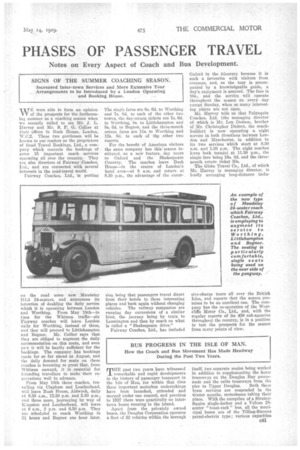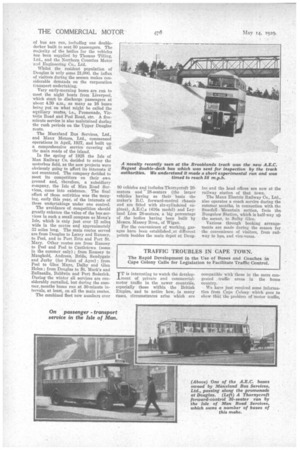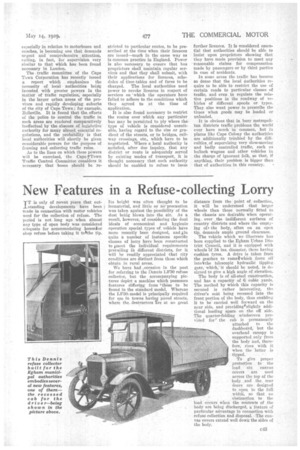PHASES OF PASSENGER TRAVEL
Page 71

Page 72

Page 73

If you've noticed an error in this article please click here to report it so we can fix it.
Notes on Every Aspect of Coach and Bus Development.
‘ATE were able to form an opinion V V of the prospects for the forthcoming summer as a coaching season when we recently called to see Mr. J. 11. Harvey and Mr. S. F. G. Collier at their offices in Bush House, London, W.C.2. These two gentlemen will be known to our readers as the proprietors of Road Travel Bookings, Ltd., a company which controls the bookings of some 15 important coach services operating all over the country. They ere also directors of Fairway Coaches, Ltd., and are connected with several interests in the road-travel world.
Fairway Coaches, •Ltd., is putting
on the road some new NI a dslay MIJ3 24-seaters, and announces its intention of doubling the daily service which it is operating between London and Worthing. From May 18th—in time for the Whitsun traffic—six Fairway coaches will leave London daily for Worthing instead of three, and they will proceed to Littlehampton and Bognor. Mr. Collier says that they are obliged to augment the daily accommodation on this route, and even now it will he hardly sufficient for the bookings. The company has bookings made for so far ahead as August, and the daily demand for seats on these coaches is becoming so great that, from Whitsun onward, it is essential for intending travellers to make their reservations well in advance.
From May 18th three coaches, travelling via Clapham and Leatherhead, will leave Bush House, Aldwych, daily at 8.30 a.m., 12.30 p.m. and 5.30 p.m., and three more, journeying by way of Kingston and Leatherhead, will leave at 9 a.m., 2 p.m. and 6.30 p.m. They are scheduled to reach Worthing in 3* hours and Bognor one hour later.
The single fares are 6s. 6d. to Worthing and 7s. ed. to each of the other two towns, the day-return tickets are 7s; 6d. to Worthing, 8s. to Littlehampton and Ss. 6d. to Bognor, and the three-month return fares are 11s, to Worthing and 12s. ed. to each of the other two resorts.
For the benefit of American visitors the same company has this'sea.son instituted, as a new feature, day tours to Oxford and the Shakespeare Country. The coaches leave Bush House—in the centre of London's hotel area—at 8 a.m. and return at 8.30 p.m., the advantage of the exeur sion being that passengers travel direct from their hotels to these interesting places and back again without changing vehicles. The railway companies are running day excursions of a similar kind, the journey being by train to Leamington and then by coach on what is called a "Shakespeare drive."
Fairway Coaches, Ltd., has included Oxford in the itinerary because it is such a favourite with visitors from overseas, and, as the tour is accompanied by a knowledgeable guide, a day's enjoyment is assured. The fare is 16s., and the service will operate throughout the season on every day except Sunday, when so many interesting places are not open.
Mr. Harvey tells us that l'alanquin Coaches, Ltd. (the managing director of which is Mr. Len Dodson, brother of Mr. Christopher Dodson, the coachbuilder) is now operating a night service in both directions between London and Manchester, in addition to its two services which start at 8.30 a.m. and 1.30 p.m. The night coaches leave both termini at 11.30 p.m., the single fare being 16s. 6d. and the threemonth return ticket 30s.
The Globe Travel Co., Ltd., of which Mr. Harvey is managing director, is busily arranging long-distance inch).
sire-charge tours all over the British Isles, and reports that the season promises to be an excellent one. The company has the co-operation of the Westclif£e Motor Co., Ltd., and, with the regular reports of its 450 sub-agencies throughout the country, is in a position to test the prospects for the season from many points of view.
THEpast two years have witnessed remarkable and rapid developments in the history of passenger transport in the Isle of Man, for within that time three important motorbus undertakings have been launched, extended and merged under one control, and previous to 1927 there were practically no intertown buses running in the island.
Apart from the privately owned buses, the Douglas Corporation operates a fleet of 33 vehicles within the borough itself, two separate routes being worked in addition to supplementing the horse tramways on the Douglas Bay promenade and the cable tramways from the pier to Upper Douglas. Both these tram services are suspended in the winter months, motorbuses taking their place. With the exception of a StrakerSquire single-decker and a Vulcan 28seater "toast-rack" bus, all the municipal buses are of the Tilling-Stevens petrol-electric type; various capacities of bus are run, including one doubledecker built to seat 50 passengers. The majority, of the bodies for the vehicles has been supplied by Thomas Tilling, Ltd., and the Northern Counties Motor and Engineering Co., Ltd.
Whilst the resident population of Douglas is only some 21,000, the influx of visitors during the season makes considerable demands on the corporation trausport undertaking.
Very early-morning buses are run to meet the night boats from Liverpool, which start to discharge passengers at about 4.30 a.m., as many as 16 buses being put on what might be called the atisiliary routes, i.e., Promenade, Victoria Road and Peel Road, etc. A fiveminute service is also maintained during the rush periods on the Upper Douglas route.
The Manxiand Bus Services, Ltd.. and Manx Motors, Ltd., commenced operations in April, 1927, and built up a comprehensive service covering all the main roads of the island.
In the spring of 1928 the Isle of Man Railway Co. decided to enter the motorbus field, as the new projects were obviously going to affect its interests if not countered. The company decided to meet its competitors on their own ground and, therefore, a subsidiary company, the Isle of Man Road Services, came into existence. The final effect of these activities was the merging, early this year, of the interests of these undertakings under one control.
The avoidance of competition should greatly enhance the value of the bus services in such a small compass as Mona's Isle, which is only just over 12 mile wide in the centre and approximately 22 miles long. The main routes served are from Douglas to Laxey and Ramsey, to Peel, and to Port Erin and Port St. Mary. Other routes are from Ramsey to Peel and Peel to Castletown (some in the summer only); • from Ramsey to Maughold, Andrerts, Bride, Sandygate and Jurby (for Point of Ayre) ; from Peel to Glen Mayo, Dalby and Glen Helen; from Douglas to St. Mark's and Ballasalla, Baldwin and Port Soderick. During the winter all services are considerably curtailed, but during the summer,months buses run at 30-minute intervals, at least, on all the main routes.
The combined fleet now numbers over 80 vehicles and includes Thornycroft 20seaters and 28-seaters (the larger vehicles having as their basis the maker's B.C. forward-control chassis and are fitted with six-cylindered engines), A.E.C.s (416a model) and Leyland Lion 28-seaters, a big percentage of the bodies having been built by Messrs. Massey Bros., of Wigan.
For the convenience of working, garages have been established .at different points besides the main depot at Doug las and the head offices are now at the railway station of that town.
The Manx Electric Railway Co., Ltd., also operates a coach service during the summer months, in connection with the Snaefell Mountain section, from the Bungalow Station, which is half-way up the ascent, to Snlby Glen.
Various through booking arrangements are made during the season for the convenience of visitors, from railway to bus, and vice-versa.
IT is interesting to watch the development of private and commercialmotor traffic in the newer countries, especially those within the British Empire, and to notice how, in many cases, circumstances arise which are
compatible with those in the more con gested traffic areas in the home country.
We have just received some information from Cape Colony which goes to show that the problem of motor traffic, especially in relation to motorbuses and coaches, is becoming one that demands urgent and comprehensive attention, calling, in fact, for supervision very similar to that which has been found necessary in London.
The traffic committee of the Cape Town Corporation has recently issued a report which emphasizes the necessity of local authorities beitig invested. with greater powers in the matter of traffic regulation, especially in the larger urban areas of the province and rapidly developing suburbs of the city of Cape Town; fer example, Belleville. It is found that the efforts of the police to control the traffic in such areas are rendered comparatively ineffectual by the absence of legislative authority for many almost essential regulations, and the probability is that local authorities will shortly be given considerable powers for the purpose of framing and enforcing traffic rides. As to the lines on ;Inch these powers will be exercised, the Cape Town Traffic Control Committee considers it necessary that buses should be re
stricted to particular routes, to be prescribed at the time when their licences are issued—much in the same way as is common practice in England. Power is also necessary to ensure that bus proprietors shall maintain regular service's and that they shall submit, with their applications for licences, schedules of time-tables and of fares to be charged. The local authorities need power to revoke licences in respect of services on 'which the operators have failed to adhere to the conditions Which they agreed to at the time of application.
It is also foundnecessary to restrict the routes over which any particular bus may be permitted to ply where the type of vehicle is censidered unsuitable, having regard to the size or gradient of the streets, or to bridges, railway crossings, etc., which have to be negotiated. Where a local authority is satisfied, after due inquiry, that any district or route is adequately served by existing modes of transport, it is thought necessary that such authority should be enabled to refuse to issue further licences. It is considered essential that authorities should be able to insist upon proprietors showing that they have made provision to meet any
• reasonable claims for compensation made by passengers or by third parties in ease of accidents.
In some areas the traffic has become so dense that the local authorities require to be able to restrict the use of certain roads to particular classes of traffic, and even to regulate the relative positions in the roadway of vehicles of different speeds or types. They also want power to prescribe the times when goods may be loaded or unloaded.
It is obvious that in busy metropolitan districts traffic problems the world over have much in common, but in places like Cape Colony the authorities are additionally troubled by the difficulties, of supervising very slow-moving and badly controlled traffic, such as bullock wagons and other vehicles in the charge of ignorant folk, so that, if anything, their problem is bigger than that of authorities in this country.




























































































































